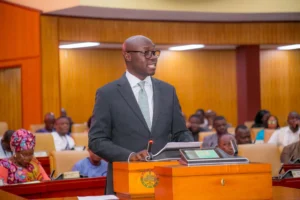
Margaret Ansei (Magoo)
Former Municipal Chief Executive of the Suhum Municipality and prominent member of the National Democratic Congress (NDC), Margaret Ansei, has advocated for a more nuanced approach to the taxation of betting winnings. Instead of imposing a blanket 10% tax on all bet winnings, Ansei, also known as “Magoo,” suggests that the government should focus on taxing the affluent bettors in order to shield the economically disadvantaged.
Ansei’s proposal urges President Akufo-Addo’s administration to delve deeper into the realm of betting taxation and formulate measures that safeguard vulnerable bettors by setting a threshold for taxable winnings, rather than applying the tax to all winnings indiscriminately. She argued that individuals who place bets with substantial sums, such as GHC1000, cannot be considered financially disadvantaged and therefore should be subject to taxation.
Expressing her perspective during an interview on Metro TV’s “Good Morning Ghana” on August 21, 2023, Ansei remarked, “I didn’t even know people could bet with 1000 Ghana Cedis. So what it means is that people can go even higher. But someone who can bet with 1000 Ghana Cedis is not poor. So at least let there be a threshold.” She went on to cite an example from the NDC’s previous approach to lottery regulations, emphasising the need for thoughtful consideration of the citizens affected by such policies.
Ansei emphasised the importance of the government gaining a comprehensive understanding of the betting industry and crafting policies that effectively regulate and address arising concerns. She posed questions about the societal impact of betting, the extent of government research on the matter, and the reasons behind youth engagement in this activity.
“Are these the problems or is it that the people are just enjoying it?” Ansei questioned, advocating for the government to proactively address the issues surrounding betting. She further stressed the necessity of providing constructive alternatives for the youth, promoting engagement in meaningful work and activities.
The government’s decision to impose a 10% tax on bet winnings has been met with mixed reactions from the public. While critics argue that the tax unfairly targets individuals engaging in a leisure activity, the government contends that it serves as a means to generate revenue for developmental projects and dissuade excessive betting, especially among the younger population. Ansei’s proposal adds to the ongoing debate, highlighting the importance of a balanced and socially responsible approach to taxation in the betting industry.






